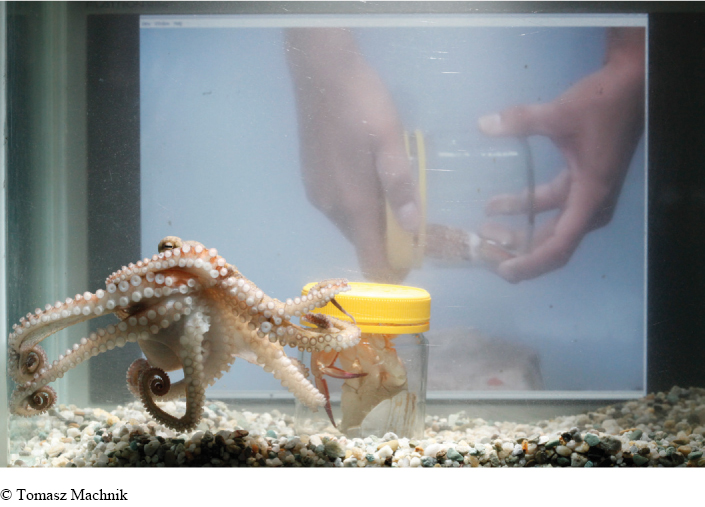11.0.6 11.8: Are some animals smarter than others?
Squids and octopuses are wide-ranging predators that must locate, capture, and subdue other animals so they can eat them. This is a far more active lifestyle than that of bivalves or snails, and it requires quick movements and rapid responses to stimuli. All of these features are conspicuous elements of the behavior of an octopus as it moves through a coral reef, inserting a tentacle into every opening. In fact, as an expert multi-tasker, an octopus can capture a prey item with one of its tentacles, use a second tentacle to hold something else, and still keep the remaining six tentacles in motion, searching for more prey. In addition, octopuses are very good at manipulating things with their tentacles. It doesn’t take a captive octopus long to learn how to unscrew the top on a glass jar to reach a fish that’s swimming inside—after all, that’s just a minor variation on twisting a clam to open it (FIGURE 11-15).

Figure 11.15: An octopus attempts to open a jar.
Because of their manipulative skills and easily observed exploratory behavior, octopuses are sometimes featured on TV shows and in magazine articles, where they are often described as the smartest invertebrates and their intelligence is compared to that of mammals. But this is the sort of claim that we must view skeptically.
Q
Question
11.3
Are octopuses smart?
What is intelligence, after all? The concept of intelligence loses its meaning when we are comparing animals that live in completely different worlds and respond to entirely different stimuli. We can say that octopuses are very good at doing the things that octopuses need to do—searching for prey, capturing it, and manipulating it, all within their marine environment, for example. But is following a complex sequence of actions the same thing as intelligence? Spiders, for example, construct elaborate webs that are strategically placed in the flight paths of insects; they detect the impact of an insect on the web and rush out to wrap the insect in silk before it can escape. Does that require more or less intelligence than opening a glass jar to eat a fish? And what about the red squirrels of northern Europe? Every fall they hide more than 3,000 acorns, cones, and nuts, then recover more than 80% of their hidden nuggets of food over the course of the winter. A human probably couldn’t manage that.
If intelligence is defined, in part, as the ability to do some problem-solving task valued by humans, the concept of “intelligence” may actually be relevant only to humans. Applying the question of intelligence to non-human species may just be an assessment of how well they can accomplish tasks that are essential to their survival. For this reason, questions of comparative animal intelligence are not generally useful. Rather, animals’ abilities should be considered as evolutionary responses to particular selective pressures imposed by their environment, and the fact that a species currently survives should be taken as an indication of some mastery of its particular niche. As stated earlier in this chapter, from an evolutionary perspective, any species alive today must be considered a success.
TAKE-HOME MESSAGE 11.8
The predatory behavior of octopuses involves exploration and manipulation, behaviors that humans often consider to be intelligent. But the concept of intelligence cannot be applied objectively to other species, which have evolved in response to the selective forces at work in their own particular niches.
Why is it difficult to determine whether or not octopuses are the smartest invertebrates?
